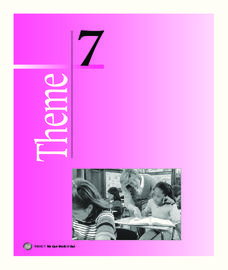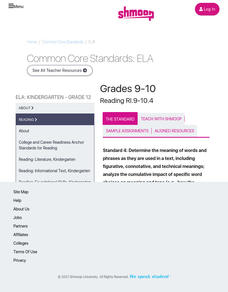Florida Center for Reading Research
Vocabulary: Word Meaning: Know or No
Activate the prior knowledge of young scholars as they expand their vocabulary with this language arts activity. Given a deck of cards containing new vocabulary words, learners sort them into four categories, from Don't know the meaning...
What So Proudly We Hail
The Meaning of America: Enterprise and Commerce
Using Mark Twain's The Man That Corrupted Hadleyburg, invite your learners to consider the concept of virtue in a democratic society devoted to gain and self-interest. This stellar resource guides your class members through a close...
What So Proudly We Hail
The Meaning of America: Freedom and Individuality
What are the strengths and weaknesses of American individualism and independence? Explore these principles through a close reading of Jack London's To Build a Fire, and engage in high-level discussion with your class by analyzing the...
ThoughtCo
Back to School Means...(Concept Web)
Going back to school doesn't have to be scary! Brainstorm what Back to School means with a concept web graphic organizer.
Curated OER
Determining Mean, Range, Median, Mode, and Probability
Students calculate mean, median, range, mode and probability. Then, working in teams, they use data from their workplace to compute values for these terms. Finally the class explores the term "probability" using a die.
Curated OER
Range, Mean, Median, and Mode
Eighth graders find the range, median, mean, and mode of a data set. For this finding the range, median, mean, and mode of a data set lesson, 8th graders collect data about the high and low temperature for 10 different cities. Students...
Curated OER
Range, Mean, Median and Mode Through the Internet
Students compute measures of central tendency. In this range, mean, median and mode lesson, students gather information on the internet, organize the data and then compute the measures of central tendency. They create a persentation...
Curated OER
Mean, Median, and Mode
Students find the mean, median, and mode for a set of data. They define terms and find examples, as well as complete practice exercises. They work cooperatively to analyze real data from a variety of websites provided. To...
Curated OER
Multiple Meanings Game
Here is a simple activity that uses definition cards that match the appropriate words to their meaning. Pupils match the cards using vocabulary words from units of study. A very basic, but often useful, resource.
Curated OER
Multiple Meanings and PowerPoint
Middle schoolers learn about words that have more than one meaning. They each create a PowerPoint presentation that has a word with multiple meanings at the top, then each of its definitions in the main body of the slide. They insert...
Curated OER
Practice With Multiple-Meaning Words
Second graders work with multiple meaning words. They participate in a teacher led lesson about words with have more than one meaning. Everyone completes a skill building worksheet in which sentences using words with more than one...
EngageNY
Sampling Variability in the Sample Mean (part 1)
How accurate is data collected from a sample? Learners answer this question using a simulation to model data collected from a sample population. They analyze the data to understand the variability in the results.
Curated OER
Shades of Meaning
Examine and distinguish between words that have similar definitions but different connotations. Middle schoolers define connotation and denotation and participate in a "shades of meaning" contest in small groups. Groups use the Visual...
The New York Times
Sequencing the Stages: Understanding H.I.V. Infection at the Molecular Level
How does HIV operate at the molecular level? Pupils discover the progression from a healthy immune cell to one infected with HIV, watch an animation of the HIV life cycle, and finally identify each of the stages with illustrations on...
Houghton Mifflin Harcourt
We Can Work It Out: English Language Development Lessons (Theme 7)
Listen, look, speak, and move are the routine steps of the English language development lessons found in a We Can Work It Out themed unit. Language proficiency is reinforced through picture cards, poems, and grand discussions about...
Curated OER
Math: Real Time and Live
Get an interdisciplinary edge. Scholars study air contamination and slope. They record the time it takes for air fresheners to reach them at variable distances. They document their times, classify them by distance, and draw a scatter...
Curated OER
Antonyms 4
Practice antonyms with your young readers! Ten questions provide one word, as well as five words underneath it. Learners choose the word from the list whose meaning is the most unlike the top word's meaning. You could use this resource...
Curated OER
Estimate and Compare Data
Seventh graders explore the values that are used in order to describe data that is collected or given. They compare data using the statistical analysis provided by finding the mean, median, and range.
Curated OER
Introduce Vocabulary: Bringing the Rain to Kapiti Plain (Aardema)
The African plains come alive as scholars learn vocabulary in context through Verna Aardema's story Bringing the Rain to Kapiti Plain (tip: this strategy can be applied to any book). Precede reading by introducing the new words pupils...
Curated OER
Introduce Vocabulary: "I Can't," Said the Ant (Cameron)
With both rhyme and a fun storyline, Polly Cameron's story "I Can't," Said the Ant is a useful resource for vocabulary in context. Emerging readers focus on five key words: cooperate, mend, nimble, sling, and trickle. After a brief...
Curated OER
Alphabetical Order
This is a vocabulary worksheet with a twist! Young elementary-schoolers put these 13 words into alphabetical order before finding their meanings, uses, and origins. They will need to use reference materials, and may need some help...
Curated OER
Introduce Vocabulary: Giggle, Giggle, Quack (Cronin)
Farmer Brown has his hands full with a tricky duck in Norah Cronin's book Giggle, Giggle, Quack, the context of this vocabulary study. This text is available on YouTube if you can't find it. Before reading, introduce the high level...
Curated OER
Introduce Vocabulary: Happy Birthday, Moon (Asch)
Can you wish the moon a happy birthday? Beginning readers contemplate this as they listen to Frank Asch's book Happy Birthday, Moon, the context for a vocabulary study. There are three words outlined here: chat, echo, and perfectly, but...
Shmoop
ELA.CCSS.ELA-Literacy.RI.9-10.4
Your pupils will be expected to determine the meaning of words and how those words affect the meaning of a text. Help them master this skill with the ideas listed here. First, look over the two activities that could be used for your...

























